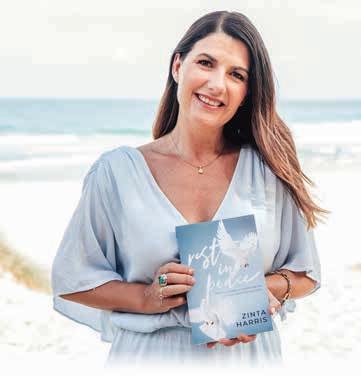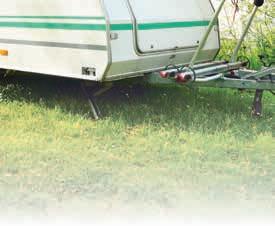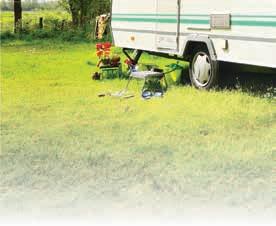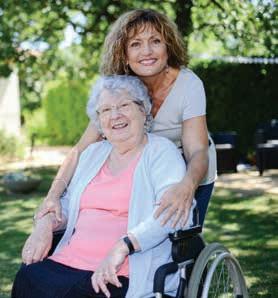
13 minute read
WILLS & ESTATE FEaTURE
By Tracey Johnstone
It’s a bit morbid talking Wills and Estates but with many readers asking for information on how they should go about preparing and updating their Will , Your Time has some helpful tips.
Advertisement
It can be a confronting task to complete, but it is an important document. A Will allows you to specify what you want to have happen to your belongings after your death and greatly eases the grieving process for your family and friends left behind who are often the ones expected to work out what to do with your goods and assets.
Be aware jotting down a few notes on a piece of notepaper isn’t necessarily going to be accepted by the courts as a legal Will. Neither is making a voice recording or using a pre-printed Will form.
Seeking the advice of a qualified solicitor can make the process a lot easier and ensure the arrangements you leave in place are legally acceptable.
Before contacting a solicitor it’s a good idea to make a list of what you own and who you would like to receive those items after your death. You should also consider who you want to manage your estate and ask them if they are prepared to do the necessary estate management tasks. Once you have clarity on these issues, then it’s time to contact a trusted solicitor.
Dying without a Will means you have died intestate. The Public Trustee then becomes responsible for your estate. It will trace beneficiaries but this can take time and attract costs that are then deducted from your estate.
Once your Will is finalised and signed, it can be tempting to put it in your bottom draw and forget about it. However, it is best to take care and remember as life changes to talk to your solicitor about a review and making appropriate changes.
Over the next two decades, we will see the biggest wealth transfer from generation to generation in Australian history. And it’s going to be complicated. With over half of all marriages ending in divorce, blended families are on the rise. When you consider that estate disputes have increased by fifty per cent over the last decade, and that over seventy per cent of these disputes are made in the context of blended families, the potential for devastating breakdowns in family units across Australia is enormous.
While taking steps to undertake comprehensive estate planning will in many cases go a long way to preventing disputes after death, even specialist estate lawyers will tell you that there is no “watertight” way to guarantee that a dispute over inheritance won’t happen.
We have all heard of those bitter estate battles that leave families broken for generations and hard-earned inheritances gouged by huge legal costs.
Sadly, in my 25 plus years of work as a wills and etates lawyer and mediator, I have been involved in too many of these awful tales. Over and over, I have seen the following patterns: • People are often in grief and, in their sadness, anger and wish to blame others, they try to use a legal process to resolve underlying emotional issues. • People often don’t know their responsibilities or rights, or what steps should be taken after the loss of a loved one. • When seeking that advice, grieving families are often steered down a traditional court process rather than being advised about alternative resolution pathways that could keep them out of court.
The fact is that people who are grieving, unsure of their rights or responsibilities, or confused by the process, can easily become driven by fear and mistrust of other family members or the executors appointed under a will. Initial feelings of sadness can be replaced with intense feelings of anger and a wish to blame others – which are of course a completely normal part of the grieving process. However, if amplified in a legal dispute, these feelings can cause significant conflict.
As devastating as the loss of a loved one can be, it is the conflict that follows when family members begin court proceedings to fight over the
continued over >
Practical Common Sense Legal Advice for you and your loved ones



Premier Legal Advisors for: • Estate Management • Wills • Estate Disputes • Retirement Village Contracts • Aged Care Contracts • Elder Law
VIDEO CONFERENCING AVAILABLE


<from previous page inheritance that can irreparably damage family relationships for generations to come.
Grieving families don’t need to start legal proceedings, they need to support to hold difficult conversations.
Instead of drawing battle lines in the sand and immediately firing shots of aggressive correspondence, families should be given some time and space to grieve the loss of their loved one. Instead of digging in the trenches and throwing grenades by issuing court proceedings supported by intensely emotional sworn statements, families should instead be encouraged to resolve the issues in dispute in a holistic way that deals with the deep-seated emotional issues that usually sit behind the legal ones.
Rest in Peace – how to manage an estate dispute without inheriting heartache – was written to give bereaved families facing the tools to resolve conflict over inheritance without going to court - not just to save the loss of a hard-earned inheritance to legal costs, but also to prevent the breakdown of family relationships.
Whether you are facing an estate dispute following the loss of a loved one, or whether you fear (or know) that a battle is coming Rest in Peace will help guide you through the disputed estates process in the least damaging way for you and your family.
Written to help families resolve their legal differences, the book guides readers though: • The emotional landscape (the impacts of grief and how to make values-based decisions Zinta Harris

that will help to reach meaningful and lasting resolution) • The legal landscape (the who, what, why and when of estate administration, the main ways estates can be contested and the law’s stance on each); and • The way forward (the options available resolve estate disputes, tips on constructive negotiation, which professionals to involve and what information will be needed – while maintaining family relationships).
To purchase a copy and to learn more visit resolveestatelaw.com.au/ rest-in-peace Zinta Harris is an Accredited Specialist in Succession Law and Business Law (Qld) and owner of Resolve Estate Law. Call (07) 3371 0795 or visit resolveestatelaw.com.au
By DON MACPHERSON
An Executor is the person named in a Will who the deceased chose to administer the estate. If there is no Will, then someone must apply to the court to be appointed as Administrator of the estate.
The Executor or Administrator is responsible for the deceased’s property and for payment of all outstanding debts and taxes from the estate funds before distributing the assets of the estate to the beneficiaries of the Will. The Executor or Administrator’s duties include: • Protecting and auditing the deceased’s assets and perhaps obtaining asset valuations; • Applying to the Supreme Court for a grant of Probate or Letters of Administration; • Contacting the beneficiaries of the estate to advise as to entitlements under the Will (or the next of kin in an Intestacy); • Collecting and recovering the deceased’s assets; • While assets are being collected, and debts paid, maintaining the assets of the deceased in the interim; • Ensuring that a statement of assets and liabilities is maintained and provided to beneficiaries upon request and at the conclusion of the administration of the estate; • Making a distribution of the deceased’s assets to those beneficially entitled in accordance with the Will or the Intestacy Rules.
An executor also acts as trustee of the estate in holding assets on trust for the beneficiaries, for example where beneficiaries are minors or are otherwise unable to hold their entitlements under the Will.
A trustee manages money, investments, or assets on a continuing basis for the benefit of certain beneficiaries according to the wishes of the deceased.
An executor must not make distributions to beneficiaries until he or she is sure that there is no likelihood of a claim being made for a share of the estate.
The executor’s first task is to determine the assets and the liabilities of the estate.
A solicitor appointed to manage the estate will usually request the executor send to their office documents and papers including: • Original Death Certificate once it has been received from the funeral home;
On receiving all required information, a solicitor can then correspond on behalf of the executor with the asset holders (e.g. banks) and with the creditors to determine the financial details so that a comprehensive statement of assets and liabilities can be finalised.
The role of an Executor is onerous, challenging, and often fraught with family tension. It is better to engage a solicitor who is familiar with the tasks involved, and without any emotional tensions, to carry out the necessary tasks in the shortest possible time. Brisbane Elder Law are experts in Estate Management, Estate Disputes, and Wills and other Estate Planning matters. Contact on 1800961622 or visit brisbaneelderlaw.com.au At de Groots wills and estates lawyers, we aim to make the process of preparing your will as simple as possible.
You may have seen on our website the section entitled “Start Your Will Online“? We encourage you to click on that link and answer the various questions it asks.
But what if you are not yet at that stage?
What if you, before completing the form, want to take some time to consider your response, or learn more?
If so, please let us briefly tell you more about wills. We hope this will assist you. WHAT IS A WILL?
A will is a document in which you state who gets what you own after you die, and the basis upon which it is to be given. There are three crucial features in any will: your executors, your beneficiaries, and your gifts to them. And if you have young children, a fourth feature is that your will can appoint guardians for them. WHO AND WHAT ARE YOUR EXECUTORS?
The people you entrust to look after your property upon your death are known as your executors. You can appoint one executor or several, and you can appoint individuals or businesses.
The role of an executor is to obtain court approval of your will – known as probate – and, most importantly, do what is necessary to ensure that your property is given to your beneficiaries, in accordance with your will.
You need to consider carefully who to appoint. You might wish to appoint your

We believe in making it personal.
Wills aren’t about lawyers, they’re about you, and your desire to ensure that the results of all your hard work are well protected. Our mission for over 30 years has been to provide easy to understand wills that are custom made for you and flexible enough to change as your circumstances change. We are pleased to announce our bespoke estate planning tool, to assist you in creating and updating a professional legal Will easily and efficiently online. To find out more visit degroots.com.au or call us today on 3221 9744. Phone 3221 9744 degroots.com.au



spouse, partner, or children, or a trusted friend, or a combination of them. The most important thing to ask yourself is who would you trust to look after your money now? He, she, or they, should be your executors. WHO SHOULD BE YOUR BENEFICIARIES?
This is the most important part of your will: who gets what. Your beneficiaries can be your spouse, partner, children, other family members, or friends. A charity or company can also be a beneficiary. The most important thing is to ask yourself who deserves your property and why. He, she, or they should be your beneficiaries.
What are your gifts?
You also need to consider what property to give to your beneficiaries?
Does one person get everything?
If not, how is your property to be divided among your beneficiaries?
Is it a percentage, or a set amount?
Should one beneficiary be given, say, a house, or shares or other property?
Or is such property to be sold and the proceeds divided between beneficiaries in some proportion?
Or do you want your property to be put into a trust, and paid in accordance with the trust?
Do you want to specify the age when an infant beneficiary can take his or her gift?
Again the most important thing to ask yourself is: if you were to give your property away now, to whom would you give it to? YOUR APPOINTMENT OF GUARDIANS FOR INFANT BENEFICIARIES
The law allows you to appoint guardians to be responsible for the welfare of your infant beneficiaries. (We can provide you a guidance document to assist the guardian to know your wishes for your children) WAY FORWARD
We suggest that you carefully consider the above questions, and then feel free to click on the section “Start Your Will Online“. Hopefully, by answering these questions, the task of completing the form can be made easier, and you can be well on your way to completing your will, knowing that you have been able to consider what is required. Visit www.degroots.com.au






CARAVANS WANTED
Wanted to buy, all caravans and motorhomes. • We come to you • Fast settlement • Finance Paid out If you want a quick no hassle sale please contact Joe for a price 0418 876 395
Rest in Peace – How to Manage an Estate Dispute
without Inheriting Heartache will help you navigate your family’s estate contest in a healthy way that can prevent an all-out family war. Written by specialist succession lawyer, collaborative practitioner and nationally accredited mediator Zinta Harris, Rest in Peace sets out the legal and personal information you need for understanding and resolving wills and estate disputes, showing how you can negotiate an agreement that will free everyone to get on with life without ongoing confl ict.
Scan QR code to purchase a copy of the book.
PEACEFUL RESOLUTION OF ESTATE DISPUTES / SIMPLIFIED ESTATE ADMINISTRATION
t: 07 3371 0795
e: advice@resolveestatelaw.com.au w: resolveestatelaw.com.au

Aged Care Advocacy
Advocacy support for older Queenslanders is important nowmorethan ever. ADA Australia had been giving olderQueenslandersa voice and protecting their rights for over 30 years. We support older people to access aged care services and resolve care related issues, through free, independent and confidential advocacy services. Advocacy services are here for everyone. Call us on











